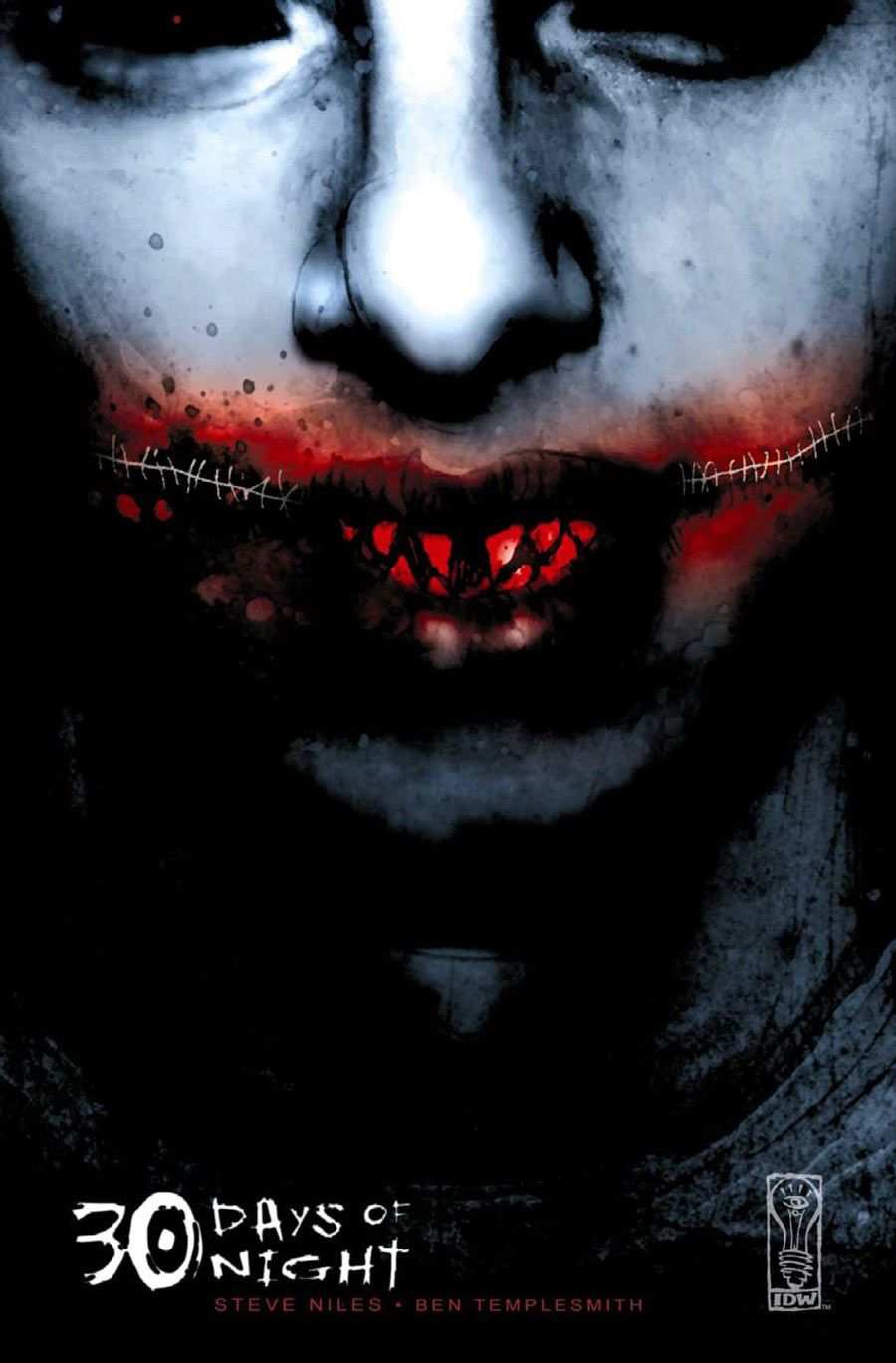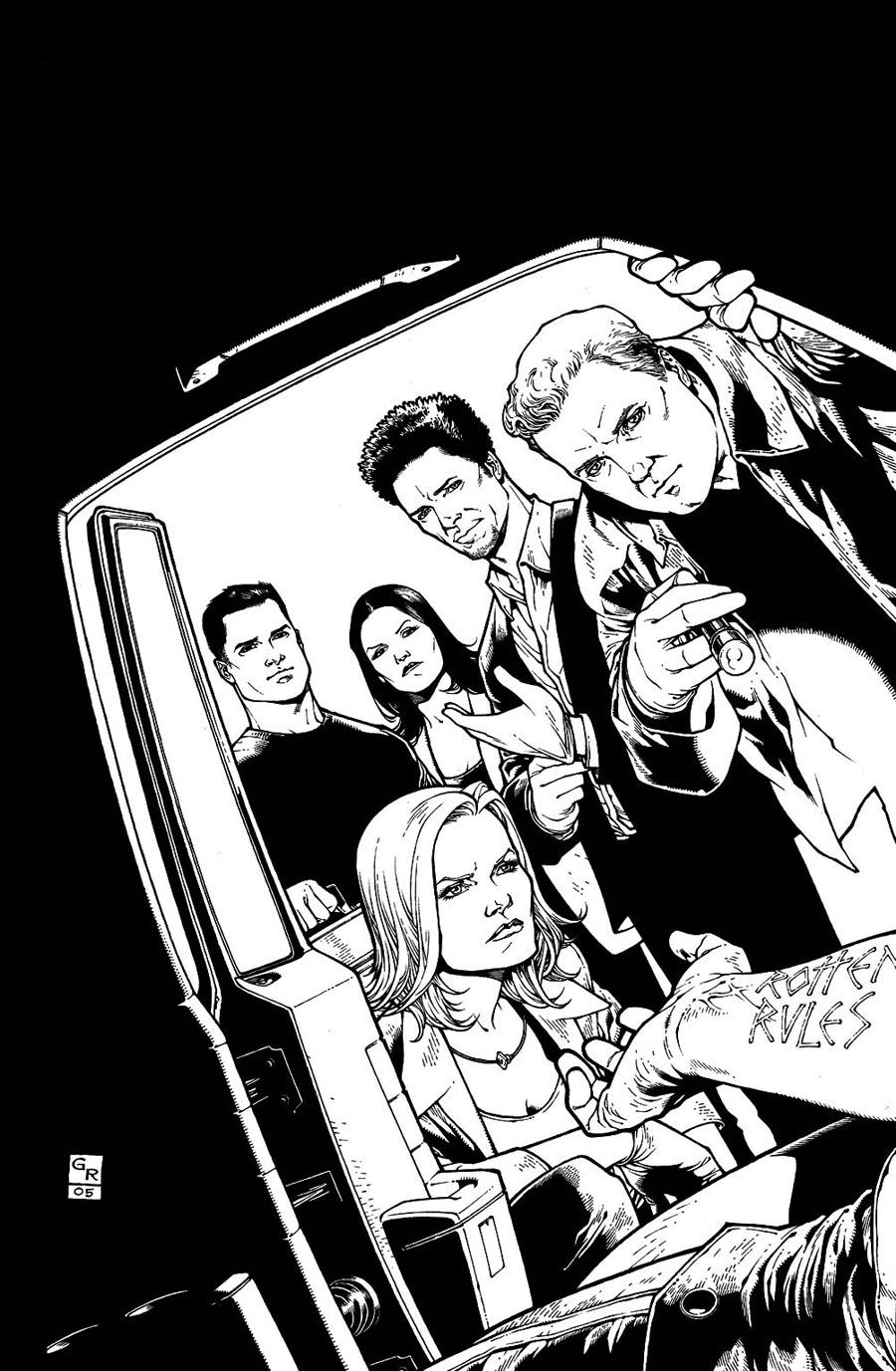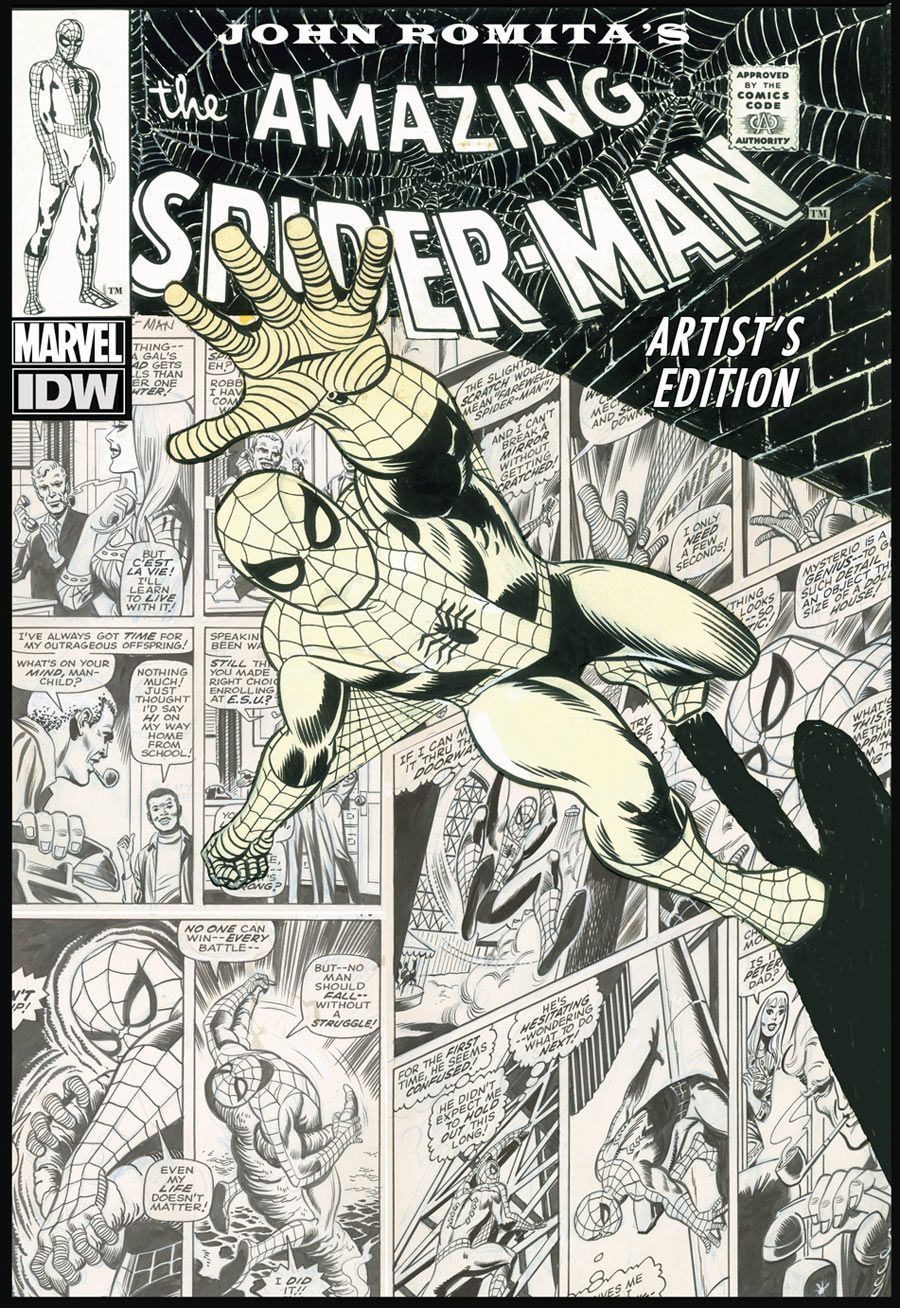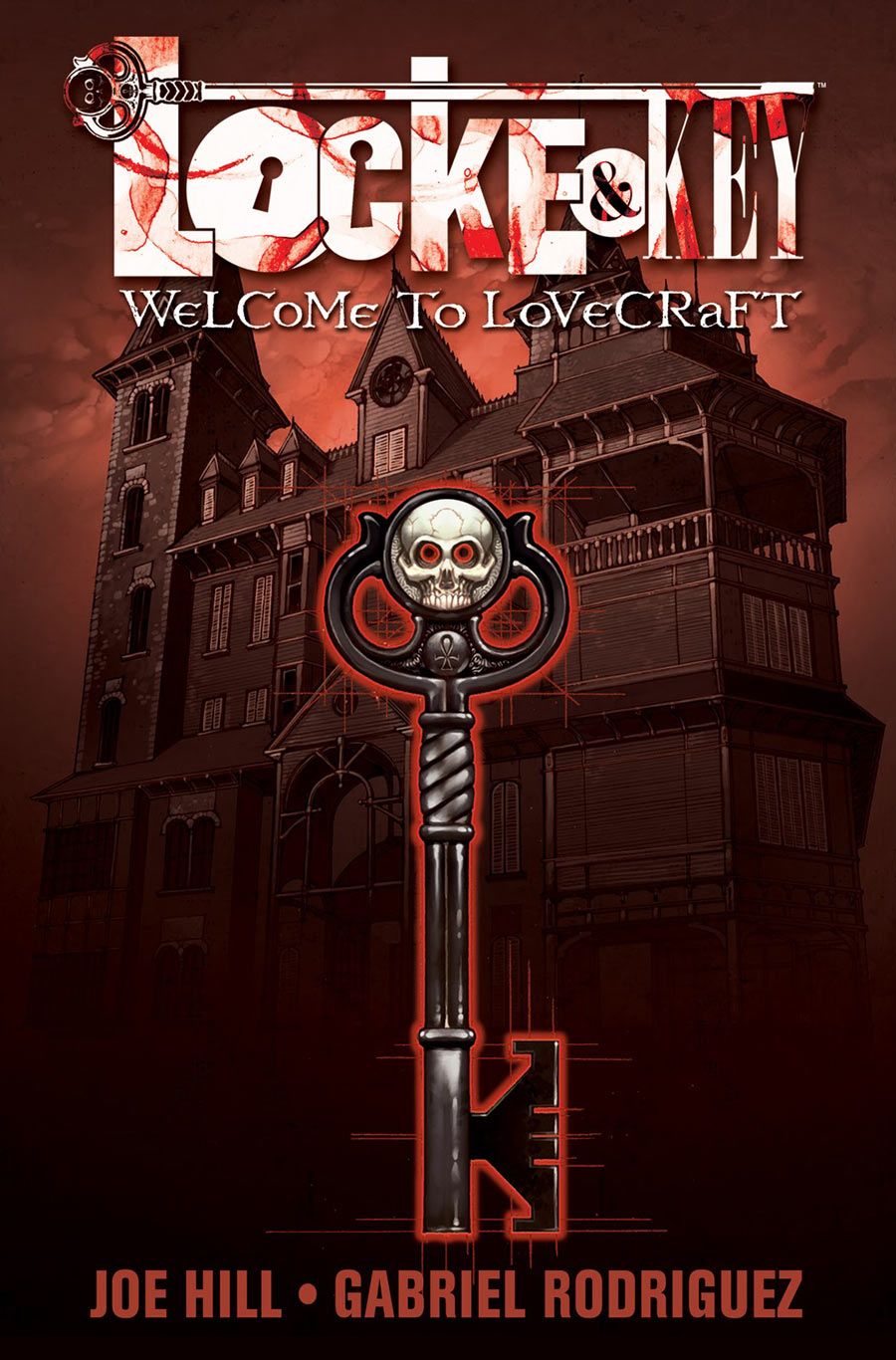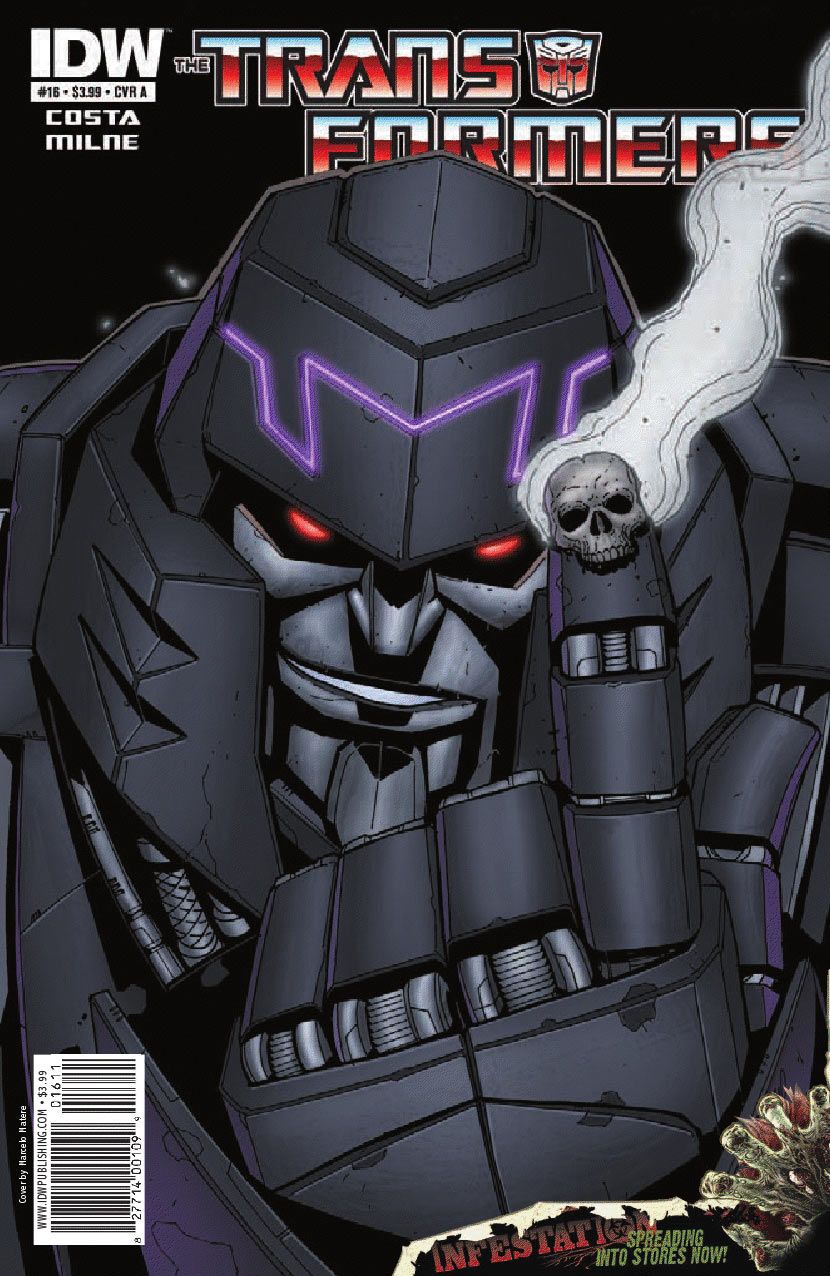IDW Publishing celebrates its 15th anniversary this year. Since its inception in 1999, the company has enjoyed a number of successes in the comic book world, including original works like "30 Days of Night" and "Locke and Key," Darwyn Cooke's adaptations of Richard Stark's "Parker" novels, high-profile licensed projects including "Transformers," "G.I. Joe" and "My Little Pony" and archival works like the oversized Artist's Editions and The Library of American Comics. It's a pretty impressive list, especially when you consider IDW never sought out to publish comic books in the first place.
As company CEO and publisher Ted Adams -- who founded IDW with Alex Garner, Kris Oprisko and Robbie Robbins -- relates, IDW was originally envisioned as a creative services business, launching in the wake of DC Comics purchasing Jim Lee's WildStorm Productions; working with outside clients and only attempting comic book publishing as a "gamble" a couple of years in. That gamble has led to multiple Eisner awards and a No. 4 spot on Diamond's 2013 year-end charts for both dollar share and unit share, with a robust 2014 slate planned.
EXCLUSIVE: Judge Choke Joins Death to Paint Swierczynzki's Mega City One Red
In the first of a two-part interview, CBR News spoke with Adams about the initial 15 years of IDW, including the 2007 purchase of IDW by New Jersey-based telecommunications company IDT Corporation, the licensed book that helped turn his business around, and the missed opportunity he calls "one of the worst business decisions" he's ever made.
CBR News: Ted, let's start with what may be an unfairly broad question -- but as founder and CEO, what's your view on how the company has grown since its beginnings? Is it something you definitely didn't see coming, or did you always have high expectations?
Ted Adams: To be perfectly honest with you, when we started, we had no intentions of publishing comic books. We were a creative service business -- we were doing art and graphic design for entertainment companies, all on a work-for-hire basis. We had all come from comic book publishing; I had worked for a variety of publishers, and the four of us that started the business had all worked for Jim Lee at WildStorm Productions at one point or another. But we really didn't want to be comic book publishers when we started the business. As far as projecting out, and seeing that we would become the comic book publisher that we are today, I really had no expectation that would happen.
I certainly knew I wanted to own my own business, and run my own business. I'm a pretty ambitious guy -- when I set out to do something, I generally am trying to set out to do something big, and try to have a business that would grow. It didn't necessarily grow in the area I expected, but I'm pleased that it did.
What was the turning point for that shift, then, and focusing more on comic book publishing?
Our creative service business was successful pretty quickly. When we started IDW, I was actually working for Todd McFarlane, but one of the other partners was still working for WildStorm. Around that time, Jim Lee was selling to DC. WildStorm actually had a creative service business that I ran for a long time, and then one of my other partners ran when I left. When DC bought WildStorm, they didn't have any interest in that creative service business. Jim Lee and John Nee were just amazing, and they said, "Hey, if you guys want to take these creative service clients, go for it. You'll be doing us a favor, because we won't be leaving these people hanging, and you guys will have guaranteed business right out of the gate." It was unusual, because we never had any of those start-up hurdles. We were actually making money before we had our first office. So the business was successful very quickly.
We were making enough money that we decided, as a group, that once a year we were going to gamble on a new business. The first year we put together a pilot for a TV show called "Bar Talk" -- basically the premise was "Blind Date" meets "Taxi Cab Confessions." Both of those shows are so old that even just saying it, I recognize how dated that sounds. [Laughs] This was more than 10 years ago. It turns out we were terrible at making a pilot for a TV show, so that didn't go anywhere. But then the next year, my old buddy [Ashley] Wood asked if we wanted to publish an art book ["Uno Fanta"], and that was the gamble we took that year, and really that is what started IDW Publishing -- and that led to doing a novel with Steve Niles, which led to "30 Days of Night," which led to "CSI;" over the course of many, many years, growing the business to the size it is today.
It really seems that "30 Days of Night," released in 2002, was that turning point comic book release for IDW. Is that how you see it?
It's interesting. It certainly is perceived that way, but when "30 Days of Night" came out, the comic itself didn't sell well at all, which is not terribly surprising, because we were a completely unknown comic book company, and Steve [Niles] and Ben [Templesmith] weren't as well-known back then as they are today. So the pre-orders for the first issue of "30 Days of Night" were terrible. I think they were a couple of thousand copies.
Because I had all these relationships in the world of comic books, I was able to go out and basically pull favors from everybody I've ever met. I was calling the people that I knew at Diamond, I was going to the press, I was calling all the key retailers, basically just giving them copies of this book that we printed that had sold terribly, but I knew was a great book, begging them to read it and talk about it. This was way before there was any kind of social media. But it really panned out for this, because Wizard Magazine got behind it -- they started promoting it as a hot comic book, they did an article about it, and it became a valuable back issue. By the time that we offered the graphic novel, there were so many people that wanted [it], that it was actually the No. 1 selling graphic novel the month it came out. It beat everything in the market, and we were a completely unknown publishing company. Imagine today, if the No. 1 graphic novel in the market was a company no one had ever heard of before. That's literally what happened. And that was just through sheer force of will. I was determined to get people talking about this book, and it worked out better than I ever hoped it would.
Our first big hit actually as a comic book was "CSI." At that time, licensed comics -- they were of course still out there, and there were some folks doing them, but it was a little more fallow than it is today. Our "CSI" comic book -- at that point we were a little more established; "30 Days of Night" was starting to be talked about, and "CSI" was a giant show on TV back then -- had really good pre-orders. Actually, pre-orders that we'd be thrilled to get even today.
And Ashley Wood worked on that "CSI" comic book.
He did. If you look at the "CSI" comic book, it's interesting -- it's not just Ash, that's drawn by Gabriel Rodriguez, who of course has done many, many things for us, the most prominent of course being "Locke and Key."
One of the things I'm proud of -- you look at IDW, and those guys that were with us from day one -- Ash Wood, Steve Niles, Ben Templesmith, Gabe Rodriguez -- they're all still with us. Ash is doing a new book with us in May called "The Beautiful War;" Steve's got "Monster & Madman" that we're launching here in a couple of weeks; Gabe's doing "Little Nemo" with us, he just finished "Locke and Key;" Ben is part of 44Flood, and we're the publishing partner for those guys.
Frankenstein's Creature Meets Jack the Ripper in Niles' "Monster & Madman"
So was it fairly soon after "CSI" when the publishing division took over from creative services as the dominate focus of the company?
Looking back on it, it feels like it all happened quickly, but honestly it happened over many years. We still do creative service work today at IDW -- it's the quiet part of our business. Typically our clients, we're doing stuff for them that they don't necessarily want the world to know. Although now that we've become "IDW," and that's a brand, sometimes we have creative service clients who want to work with us specifically we are IDW, whereas 15 years ago, we were just four guys that were helping them get work done.
As far as how that transition happened, it was a pretty slow business. What helped us was bringing on Chris Ryall [in 2004] who's still our editor-in-chief and chief creative officer. He really brought his vision to the publishing. Chris is one of the smartest people I've ever met; he just knows how to get stuff done. When he came on board, he was really pushing me to build the business, and was really the driving force behind us going after "Transformers" as a license. If you look at that transition from creative service to becoming a publishing company, and then a bigger publishing company, that key hire in the early days was certainly Chris Ryall.
Speaking of " Transformers," licensed projects have certainly become a big part of IDW's identity, but from what you were saying, at the time, the first "CSI" comic was something of a risk -- that seems to have definitely paid off.
Certainly, nobody else was looking at "CSI" as a comic book back in those days -- it just wasn't something that anybody was considering. I think what our approach to it was to try and bring great talent to it. Max Allan Collins wrote those comics for us; I felt like he was just the perfect guy to write those comics, and he was. Gabe Rodriguez -- it wasn't hard to identify early on that Gabe was going to become a superstar. And Ash did us a favor by doing the flashback sequences.
I think that's really been the way that we approach our licensed books, even today -- we come to them with the intention of making great comics. If you look at our books today, our "[Teenage Mutant Ninja] Turtles" books are regularly on best-of lists. The "My Little Pony" books are loved. "Judge Dredd" -- these are books that we're bringing top-notch creative talent to. Maybe before, if you look back to the way licensed comics were perceived, they were thought as not necessarily being able to be great comics, and that was always our goal -- to try and make great comics out of them.
Looking at the past 15 years, what do you see as some of the biggest triumphs for IDW? Maybe some things that took you by surprise?
Honestly, even going back to "30 Days of Night," having that book be the No. 1 graphic novel was a huge surprise for us. But the early days of "Transformers" -- those books just found an audience really quickly, and really gave us the freedom to start to grow the business, because we were starting to generate real revenue from those. That was certainly a big step forward for us. Doing "Angel" with Joss Whedon and Brian Lynch, those comics were a big step forward for us. It was all driven by the creative -- what Joss Whedon and [late artist Franco Urru] were doing with those comics, they were just good comics, whether you liked "Angel" or you don't even know "Angel." So that was a big step forward for us. We did "Metal Gear Solid" with Ash Wood -- even today, that book still sells like crazy for us. If you look at the art that Ash did; it's a video game adaptation, which would seem on its face to be something that would not be worth your time. But what Ash brought to that is just extraordinary. That art's unbelievable. Every page could be hung in a gallery.
There's just been so many things. I remember when Scott Dunbier came and joined us, who clearly was another key person for IDW, one of the first things we did was we drove up to LA and had lunch with Darwyn Cooke. I'd never met Darwyn before, and was of course a huge fan of everything that he's done. We sat down, and I had no idea what they were going to talk about. And Darwyn said, "I want to do adaptations of these novels by this guy Richard Stark, based on a character, Parker." My jaw just dropped, because I loved those books. I grew up reading those books. No matter what Darwyn was going to propose at that lunch I of course was going to do, but the fact that he wanted to do something that I've loved, and had so much passion for, it was one of the best days of my life. I came back, and had to sort out who owned those rights, trying to get a deal done. At that time, Donald Westlake was still alive, and he was a great guy, but no one had ever done graphic novels based on his work, so it was an all-new thing for him and for his literary agent. So the deal was fairly complex. But I'm extremely proud of those books. I think the work that Darwyn does on those is extraordinary.
If you look at what I kind of think is the defining creator-owned series, for IDW, "Locke and Key" would have to be that project. Joe [Hill] and Gabe, during the course of that series, were at the top of their game. It's such a great story that has a beginning, middle and end that's told over six graphic novels. It's an unbelievable, beautiful piece of work. IDW got behind that book in a way that I think a publisher should get behind important works like that. Every opportunity that we had, we were marketing and promoting that book. I was determined that book was going to find as big as an audience as it possibly could. It didn't happen all at once, but over the course of several years, that book did find a big audience, and continues to find an audience. That's something I'm really proud of.
What Scott does with the Artist's Editions -- every single time we get an advance copy of an Artist's Edition, I just sit there and look at it and go, "Yeah, I just published John Romita 'Spider-Man.' Are you kidding me? I just published Will Eisner 'Spirit.'" Just to be the guy that's publishing these things -- we just published Jeff Smith's "Bone." How crazy is that? We published Walt Simonson's "Thor." We're doing Sergio [Aragones]'s 'Groo.' These books, when they come in, every single one of them, I just think, "Yeah, that's crazy, I don't know how it's even possible that I'm publishing these things," but it's like a dream come true.
I could go on. The Library of American Comics -- the books that Dean Mullaney and Bruce Canwell put together. It started with us doing "Dick Tracy" by ourselves, and then very quickly Dean came in and created The Library of American Comics. I feel the same way about those books -- we get those in, and I just think, I grew up with "The Smithsonian Collection of Newspaper Comics" a million years ago. At that time, you didn't have access to all these strips in the way that you do today. I would pore over this book, and there would be maybe three pages of "Terry and the Pirates." My dream was to be able to actually read more "Terry and the Pirates." And here we are today, we've published all of Milt Caniff 's "Terry and the Pirates" strips. You can read all of them through IDW and Library of American Comics. Again, it's like a dream come true.
On the topic of these highlights for IDW, let's go back to "Locke and Key" a little bit, which is such a notable success, because it's one of the relatively few comics in the last 10 years or so that's been a true crossover hit. I know people who read "Locke and Key" that I would not guess read any other comics -- you see that with "The Walking Dead," but that has a massively popular TV show behind it.
That's an instance of being able to see IDW grow at the same time Joe's career was growing. When we started doing "Locke and Key" with Joe, he wasn't the well-known author that he is today. He was certainly a really critically acclaimed short story writer, and had won lots of awards, and that's actually what drew me to his work in the first place, an anthology that he published with a UK publisher. Actually, it was Neil Gaiman's blog that mentioned this book by Joe Hill. I couldn't believe how good the writing was, I truly was just blown away by it. So I emailed him, and that led to "Locke and Key." His career took off at the same time as IDW was really starting to take off, and ultimately those things really worked together well. His big literary career has certainly brought lots of people to "Locke and Key."
After talking about the many victories that IDW has had, let's turn to the opposite side of that over the past 15 years -- early on, were there times that you weren't sure if this was going to work long term? Or notable disappointments while running IDW?
I think as an entrepreneur, and as somebody who publishes 70 books a month, that we have misses all the time. I try not to spend a lot of time thinking about those, other than I try to figure out, "What did we do wrong? What could we have done better? Why didn't the market respond to this? Was there something creatively that we could have done better?" I certainly think about those things. But I don't sit at my desk and agonize and bash my forehead. But there have been lots of misses over the years. We've published many, many thousands of comics and books.
In the early days, though, there's one that does stand out for me. There was a collectible miniatures game called "Mage Knight" that was super-successful. On our creative service side, we were the behind-the-scenes people on that, creatively. Jordan Weisman created the game, and he created WizKids, so certainly the game and everything around it, the universe and everything, was all Jordan Weisman. But the actual character design was IDW. So we actually designed all those characters for him on a work-for-hire basis.
One of the worst business decisions I've ever made is that Jordan came to me very early -- I think even before WizKids was called WizKids -- and he said, "I can either write you checks to do this work, or I can give you a little bit of ownership in what this is going to become." It was right around the same time that we were starting our own business, so I didn't feel like I was in the position to take on ownership of another business. We really wanted the cash more than we wanted to own another business. Terrible decision, because Jordan made WizKids and "Mage Knight" into a hugely profitable entity, and then sold it to Topps. So we would have made a million times more than what we did on the creative service side. So that was bad decision No. 1.
The second part was, we asked Jordan if we could do comics based on "Mage Knight." Those books just didn't work. I'm not sure if it was because we made a mistake creatively, or the audience for the game didn't want the comics. It's been a long time, so I don't remember specifically where we went wrong, but those comics didn't work. It was probably our first big miss as far as trying to bring an entertainment property to comics.
Also wanted to ask about the 2007 purchase of a major interest in IDW by the IDT Corporation. How did that change the company? It seems like it was the type of thing that, at least from an outsider perspective, to be as an ideal of that type of situation can be, since IDW has prospered in the years since then without any noticeable change in identity, and you've remained in a top position. How did that move change IDW?
I'm fortunate, because it didn't change IDW at all. The primary guy over there is Howard Jonas, who's the chairman of IDT, and actually the chairman of IDW, as well. He's just a great guy. He's been nothing but just a tremendous business partner for the last four or five years. It didn't change the way we ran the business, and Howard's of course very happy with his investment -- the company is worth significantly more today than when he made his investment, and there's nice earnings from the company every year. But that aside, he's just been nothing but supportive. There's never been anything than just support from him, so that's really, I think, unique, to have a majority investor that's willing to let us be the experts that we are.
As far as how it changed the business, there's one specific thing that it did. We didn't do it for the money, we actually did it because we had two partners who wanted to get out of the business, so this was a way to basically let them cash out. IDW has always been a cash flow positive business from day one -- I know that's almost impossible to believe, but it's true. That's really unique for a small business. So it wasn't a cash thing for us where we needed investment money. What it did was, it gave me a little more courage to make financial gambles in a way that I might not have if it had just been my own money. Howard was really encouraging me to grow the business, and I knew he was there for me -- if we did find ourselves in the position where we needed some infusion of capital, that he would have been there for us. We've never actually needed it, but just knowing that he was there behind us and backing us freed me up a little bit to make decisions that I might not have otherwise.
The one that comes to mind really is, we had the opportunity to bring on [IDW president] Greg Goldstein, who has been a senior executive at a bunch of companies -- Topps, and Upper Deck Entertainment, and various places. That was around the time that we did the IDT transaction. I, frankly, probably wouldn't have brought Greg on if it had been my own money, because I would have been nervous about increasing staff, and increasing overhead. But knowing that I had that security from Howard gave me the courage to do that. Hiring Greg, in the same way that hiring Chris and hiring Scott and other folks that aren't as publicly well known, really changed IDW. He came in and helped me run the day-to-day operations of the business, which really allowed me to start thinking about how I could grow the business. He's just a really smart guy who also had lots of contacts. If I had to identify one thing that came out of that IDT transaction, it would probably be Greg.
Check back with CBR later in the week for more with Ted Adams, discussing what he has planned for IDW's future.


